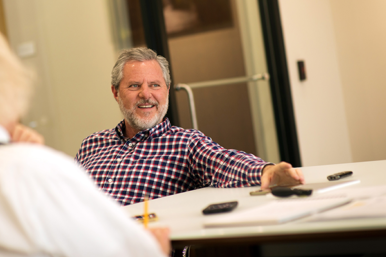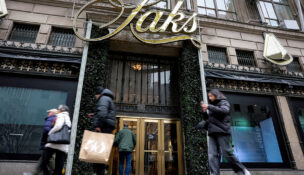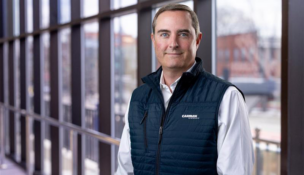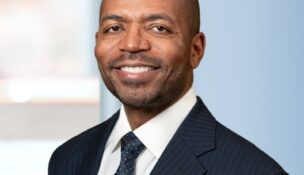Online pioneer becomes powerhouse
Liberty now has more than 111,000 students
Gary Robertson //December 30, 2019//
Online pioneer becomes powerhouse
Liberty now has more than 111,000 students
Gary Robertson //December 30, 2019//
If colleges and universities have a golden age, then this may be Liberty University’s.
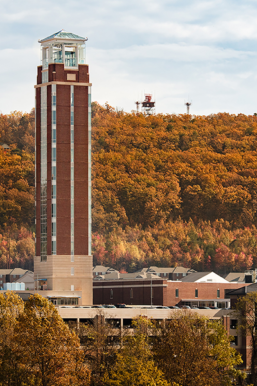
Founded in 1971 by televangelist Jerry Falwell Sr., the Lynchburg-based institution will mark its 49th year in 2020.
For decades, the school battled debt — at one point in the triple-digit millions — and was threatened with losing its accreditation.
Today, Liberty University — a 7,000-acre evangelical Christian institution often held up as one of the most conservative bastions of higher education in America — is the largest college in Virginia and one of the world’s largest Christian universities by enrollment.
The turnaround, especially in recent years, has been remarkable.
After years of counting pennies and sometimes coming up short, Liberty now is financially strong — with an endowment valued at more than $2 billion, according to university officials following a recent audit of finances. In September, the university also reported total assets of $3.13 billion.
And combined with the clout wielded by Jerry Falwell Jr., the university’s high-profile, well-connected and controversial president, Liberty has been able to attract a long line of political luminaries, sports stars and celebrities as speakers.
Recent commencement speakers include President Donald Trump, former President Jimmy Carter and Vice President Mike Pence. Former U.N. Ambassador Nikki Haley, NFL stars Brett Favre and Michael Vick and actors Gary Sinise and Dean Cain have been featured guest speakers at the university’s weekly convocations.
Looming large
During the past 12 years, the university has raised its cash and assets while pouring $1.6 billion into changing itself from a little-known outpost of higher education into a showcase for the transformational power of money, proper positioning, aggressive marketing and — it has to be said, prayer — on a college campus.
When Lynchburg Regional Business Alliance CEO Megan Lucas goes out of town to court economic prospects, she jokes that the region’s official bird is the construction crane.
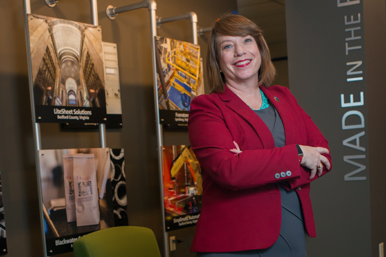
During the past several years, “every crane west of Richmond has been in Lynchburg on the campus of Liberty University. It’s our economic engine,” Lucas says.
The fevered pace of building and campus development has been breathtaking at times, she says. It’s perhaps best evidenced by the university’s 275-foot-tall Freedom Tower. Opened in 2018, it rises above the Rawlings School of Divinity, which bills itself as the world’s largest school for religious studies and ministerial training.
“The buildings are significant,” Lucas adds. “You think about a state-of-the-art indoor track, a state-of-the-art natatorium. Since I’ve been here, they’ve built those two buildings. They finished a baseball stadium and a softball stadium. They expanded the football stadium. They added a school of business.”
A momentous spike in enrollment occurred between 2007 and 2016, when the university saw a compounded annual student growth rate of 13.94%.
Today, Liberty is one of the nation’s largest private nonprofit educators, with a total enrollment of more than 111,000, including 15,500 on campus and a huge online student body.
Once a pioneer in online education, Liberty is now a powerhouse in the field.
Heeding the call
“It started in 1976 with nonaccredited courses for adults. In 1985, we started with accredited courses. It didn’t make any money for about 20 years. It was just a way for people who couldn’t move and leave their jobs and mortgages to get a degree,” he says.
“But during that 20 years, between 1985 and 2005, we perfected [online education] and got the Southern Association of Colleges and Schools to bless it, as far as being comparable in academic quality to residential instruction.
“In 2005 … everyone started getting high-speed internet in their homes, and we were the only nonprofit school in the country poised to serve that huge adult market of people who didn’t finish college or [who] needed a master’s degree to get a promotion,” Falwell says.
Between 2004 and 2014, Liberty’s online enrollment surged by 740% from around 11,000 online students to more than 95,000, according to a report by the Chronicle of Higher Education.
Falwell’s father left a life insurance policy that paid out $29 million to Liberty University at his death in 2007. The university’s debts were paid, but it had no significant endowment funds.
The younger Falwell made it his mission to raise an endowment that would secure the university’s future and immunize it from making choices that would compromise its Christian principles.
“If online went away tomorrow, we would have enough income from our [$2 billion] endowment to subsidize our resident program for perpetuity,” Falwell says. “And we’re adding to it about $250 million a year right now.”
He adds, “We just had our best year ever,” with a billion dollars in revenue. That’s up from an annual revenue of $860 million five years ago.
Liberty’s total assets grew by $317.5 million in just the last year, and its operating revenue earned last year grew by $92.7 million, while operating expenses grew by only half that rate, according to the Liberty Journal, an official publication of the university.
One driver of that revenue growth, according to Falwell, has been increasing margins — revenues over expenses — in the online program while also keeping an eye on residential program expenses, often trimming programs where demand is diminishing.
The Liberty president says he thought “we’d have more competition” online from other colleges than there is now, “and the reason we don’t is that tenured faculty [at other institutions] don’t think [online teaching is] prestigious enough.”
Liberty does not offer tenure to its faculty members.
Speaking at his office, Falwell, whose pastor father favored dark suits and a red tie, appeared in a checkered button-up shirt, jeans, loafers and a Burberry jacket with an embroidered LU logo. He wears suits, of course, but casual dress is part of his personality.
Falwell, a graduate of the University of Virginia School of Law, never sought Liberty’s presidency, he says.
“When I took over [in 2007], I was 44. I had been an attorney, and I had been a commercial real estate developer, and I hated public speaking. So, I didn’t want to be [president] … but I had to be.” he says.
Falwell explains that he knew the business side of the college from his long tenure as the university’s general counsel. He also served as a member of the Liberty’s board of trustees before his father’s death.
“My job as general counsel was to … restructure debt, negotiate with creditors, talk them into not foreclosing and finding money to make payroll. You talk about a high-stress job, and I was the only one who he [Jerry Falwell Sr.] would tell how bad things were.”
In his autobiography, Falwell Sr. praised the younger Falwell’s business acumen.
“He is more responsible, humanly speaking, for the miraculous financial survival of this ministry than any other person,” the elder Falwell wrote.
In time, Falwell Jr. says he warmed to the role of president and has poured himself into the job.
“I finally did become comfortable with the public side of it. They say I was so shy before, but now I won’t shut up — that’s what my family says. So, I’m doing what I always thought I would hate,” Falwell says, laughing.
Casting stones
Much like his father, who founded the political organization Moral Majority in 1979, Falwell Jr. is also a lightning rod for controversy.
When Falwell urged students to obtain concealed weapons permits in 2015, it set off a firestorm, but that didn’t slow down Liberty’s move toward making firearms a part of the campus environment.
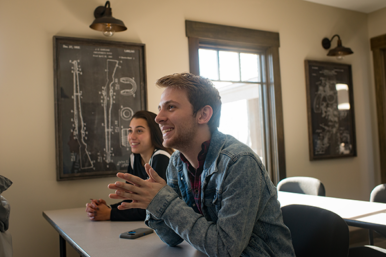
In 2018, in response to what Liberty officials have portrayed as a student interest, an athletic opportunity and a commitment to the Second Amendment, the university opened its $3.2 million Liberty Mountain Gun Club shooting range.
Falwell has also been very public with his support for Republican candidates and political figures, notably recently naming former GOP Rep. Dave Brat as dean of Liberty’s business school.
Last month, the university announced the establishment of its new Falkirk Center for Faith and Liberty, a conservative think tank co-founded by Falwell and Turning Point USA co-founder Charlie Kirk, a prominent supporter of President Trump. The organization is “dedicated to renewing and defending God-given freedoms in America and restoring Judeo-Christian-based principles in our national policies, institutions and culture,” according to a university news release.
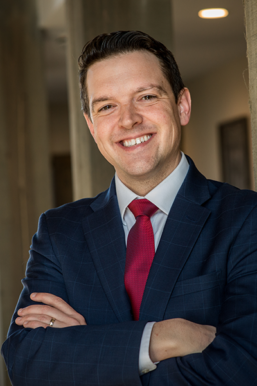
Falwell’s enthusiastic endorsement of Trump’s 2016 presidential bid drew criticism from a Liberty student group that argued that Trump did not reflect Liberty’s Christian values. Falwell has said his endorsement was personal and not on behalf of the school. Nonetheless, the nonprofit, tax-exempt university later drew criticism for selling Liberty-branded Trump hats and T-shirts featuring Trump’s “Make America Great Again” campaign slogan when he spoke at the university in 2017.
More commotion was raised this year after Politico Magazine and Reuters issued reports — based on interviews with anonymous critics and leaked emails — questioning whether the university’s resources were being used for the financial benefit of Falwell friends or family members.
For example, the university sold an 18-acre sports facility with a fitness center and tennis courts to Falwell’s personal trainer in 2016. Reuters reported that the university sold the property to the trainer for $1.2 million after Liberty paid the trainer $650,000 in advance to lease back tennis courts over the next nine years. The university financed the transaction’s remaining $576,000 with a 3% interest rate loan to the trainer, who wasn’t required to put any money down, Reuters reported.
The university issued a detailed response to the Reuters story, describing the sale as beneficial to the university. A Liberty trustee had donated the athletic center to the university in 2011 and it had become “a drain on university resources,” Falwell said in the statement. The trainer, who had been leasing space to run his business in the facility’s fitness center since 2013, was “the most viable purchaser,” according to the university.
Falwell explained in the statement that the facility’s reduced price reflected the fact that Liberty retained rights to use the tennis courts, disrupting the ability of the new owner or any successor to fully utilize the facility, thus diminishing its value.
Reuters also reported this year that former Trump lawyer Michael Cohen, who is serving a three-year federal prison sentence for fraud, lying to Congress and campaign finance violations, was recorded by actor Tom Arnold saying Cohen had helped Falwell prevent the release of personal photos. In a statement from his lawyer, Falwell has denied the existence of any such photos or seeking legal assistance from Cohen, whom he described as a longstanding friend.
In January 2019, The Wall Street Journal reported that Cohen paid a company owned by Liberty’s chief information officer to attempt to rig two online news polls in favor of Trump in 2015.
Falwell and Liberty have issued lengthy rebuttals to the various allegations and news reports. At one point, Falwell accused disgruntled former university employees and board members of “an attempted coup” in making highly critical anonymous comments in the Politico article. He told other media outlets in September that he had contacted the FBI over emails leaked to the press that he said amounted to stolen university property.
Falwell says he “thrives” on controversy.
“If the right people are upset with you, it means you’re doing something right,” he adds.
Yesterday, today and forever
Falwell believes that Liberty’s current residential population — topping out at 15,500 — is the proper size for the university’s Lynchburg campus, and he doesn’t plan for it to grow.
His father had hoped that Liberty would grow to 50,000 students, and might have found it miraculous that online degree-seekers would catapult Liberty’s enrollment over the 100,000 mark.
The elder Falwell also would have undoubtedly been pleased by the endowment his son has built, which Falwell Jr. says will provide a future stream of resources that will ensure Liberty’s stability.
It will, he says, allow the university to move forward “into infinity … with 3%, 4%, 5% returns every year.”
Meanwhile, the money from the school’s online students — average age 37 — continues to pour in, as do students and conservative parents who are attracted to Liberty’s strict moral code governing residential students — no premarital sex, no alcohol, no tobacco, no social dancing.
Rob Jenkins, a professor for Georgia State University and a columnist for the Chronicle of Higher Education, says that 2019 was the eighth straight year that higher education enrollment has declined, and it will fall further, forcing numerous colleges to close.
But he believes that Liberty and other institutions with large endowments and a pipeline of ready students will survive the enrollment decline.
But even though the university’s doing well now, Falwell says, it must be prepared for anything.
“You don’t know what the next president’s policies will be toward religious institutions, you don’t know what the climate is going to be for a student loan program,” he says. “Nobody has a crystal ball.”
e


